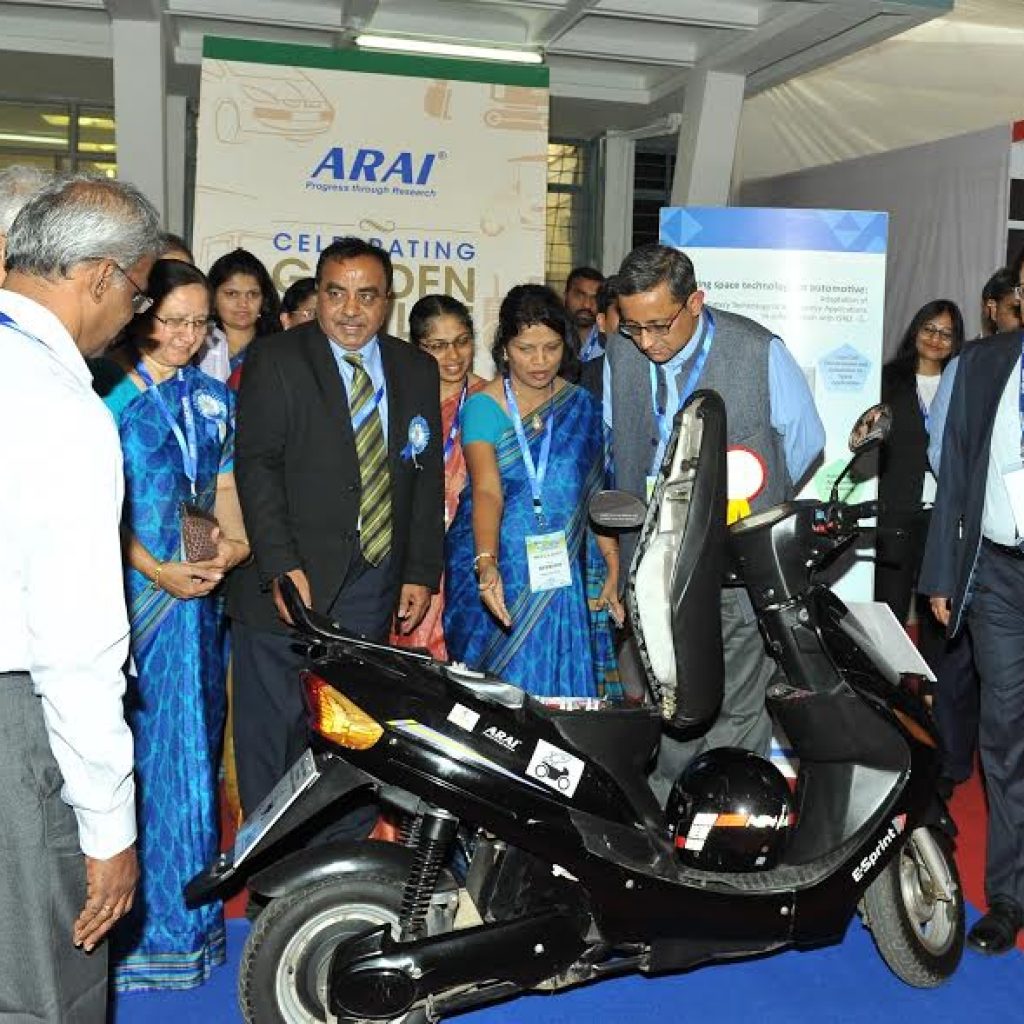ARAI successfully adapts ISRO’s Lithium – Ion battery technology in an electric two-wheeler

ARAI – ISRO Joint research project yields success
Pune, January 19: A Lithium Ion Battery Indigenously developed by Indian Space Research Organization (ISRO) for space applications was successfully put to use in an electric two-wheeler by the Automotive Research Association of India (ARAI). ARAI and ISRO are jointly working on a project to explore the applications of Lithium Ion battery technology used in space for surface transport vehicles and this success may come as a big boost to electric mobility in the country.
A prototype (two wheeler) developed using the Lithium Ion Battery of ISRO was unveiled at the hands of Sanjay Mitra, Secretary, Ministry of Road Transport and Highways, Government of India during the inauguration function of the Symposium on International Automotive Technology (SIAT 2017) at ARAI Campus in Pune. Sanjay Bandopadhyaya – CEO, NATRiP, Rajan Wadhera – President ARAI, Vikram Kirloskar – Vice President ARAI, Rashmi Urdhwareshe – Director ARAI, Murali Iyer – Executive Advisor SAE International, Dr. R. K Malhotra – President SAE India and T. Mookiah, Associate Director R & D Vikram Sarabhai Space Centre were also present on the occasion.
The Symposium on International Automotive Technology (SIAT 2017) is underway at the ARAI Campus on Vetal Hill, Kothrud till January 21st. Many organizations from India and abroad that are working in the field of automotive technology are participating in the exhibition, which has been organized at the same place under SIAT 2017.
While sharing some details of this prototype (two-wheeler) Anand Deshpande, Convenor of SIAT 2017 said, “This is a landmark development under the joint research project of ISRO and ARAI, where the Lithium Ion Battery technology developed for the space applications was successfully adapted for the automotive segment. We at ARAI have worked upon on various factors like Battery Management System, Lab Testing, Road Testing, Automotive Duty Cycle at different temperatures, charge and discharge.”
“In space applications, reliability is of paramount importance. Whereas, in automotive segment affordability is equally important. Thus, our teams are now working in this direction. The prototype that was unveiled today is loaded with 48 Volt 50 ampere-hour battery and successfully runs up-to 90 kilometres once charged for 2 hours. We are working on reducing the charging time and have set the target to bring it down to 1 hour initially. It does not use much electricity for charging and the running cost per kilometre could be as less as 20-30 Paise per kilometre. The vehicle can attain the speed of 40-50 kilometres per hour”, he added.
To commemorate ARAI’s Golden Jubilee celebration, a special short film competition on road safety was organized. Winners of the competition including Venkatasubramanian R (Bengaluru), Bhushan Popatrao Manjule (Pune) and Nachiket Khasnis (Pune) were given a cash prize of Rs.25000/- each. A special booklet having a compilation of cartoons of Mangesh Tendulkar on Road Safety was released on the occasion.





